- By Dan Veaner
- Around Town
 Print
Print | A Visit to Mbaka Oromo Primary School In next week's issue we will share our interview with Harold and Cindy van Es in which they share some of their experiences visiting Kenya over the holiday break last December, and how their family traversed a war zone to see the school and meet the community they have partnered with. | ||
If you can imagine this you can begin to imagine what it has been like at the Mbaka Oromo school in western Kenya. In 2006 Lansing students did try to imagine it by living a day as their Kenyan counterparts do. It wasn't easy. A remarkable part of this story is that Lansing kids don't have to imagine it -- they have actually exchanged letters and school projects with the kids their age in Kenya. By doing so they have explored and shared their little world here, and broadened it in a unique and personal way by hearing about another culture from the people they really listen to -- other kids.
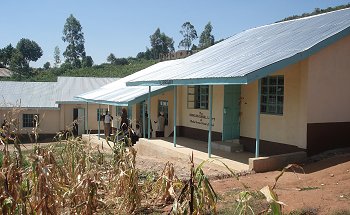
The Cornelius / Cargill Library and classrooms at the Mbaka Oromo school
that don't wash away in the rain are among the accomplishments of PALS
When Harold and Cindy van Es concieved of the Partnership of African and Lansing Schools (PALS) they may not have realized the profound impact that partnership would have on both cultures. But they didn't want the program to be just sending money to Africa. "That was by design," says Harold. "We always felt that there would be a true partnership that would flow in both directions. Yes, more of the resources came from us to them, but that there would also be something that they would give to us. That is us learning about them, their children writing letters, and that our students would learn what it was like over there."
The van Ess chose a school to partner with that has qualities our community could relate to. "There are the commonalities," Harold says. "Their school has close to the same numbers of kids. They're near a lake. They're near a university. There are some common things in their lives."
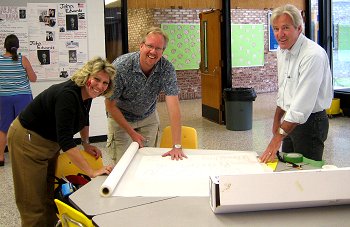
(Left to right)Cindy and Harold van Es and Bob Rasmussen
preparing signs for the PALS fundraiser two weeks ago
The school teaches grades K-8, and has recently started a pre-school program. Graduates take a national exam to qualify for local, provincial, regional, or national high schools. Many students from Mbaka Oromo qualify, even for national. But going to high school costs money that many of the students, 40% of whom are orphaned by a devastating AIDS epidemic, can't afford. The van Es family sponsors a girl, paying about $350 - $400 per year. They say the difficulty in getting sponsors is finding people who are willing to make a four year commitment to get a child all the way through high school.
PALS is made up of Harold (President) and Cindy (Treasurer), Maureen Bell (Director of Education), Chris Barrett and Caroline Rasmussen. Rasmussen's brother, Jim Nowack, who had just retired from a school system near Rochester, also got involved, spearheading 'Joining Hearts and Hands,' a similar group in ROchester that has raised money for Mbaka Oromo and other schools. Nowack has traveled to the school several times, even helping to physically build classrooms. In addition a PALS Club was formed at Lansing High School in 2005.
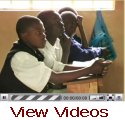 The organization has made an impressive difference in the physical plant at Mbaka Oromo. In partnership with 'Joining Hearts and Hands' it has built eleven classrooms, a library, and an administration building. The Rochester group is currently building a kitchen so kids can have lunch at school. The van Ess say that a library at a primary school is unheard of in that part of the world. PALS is working on filling it with books. "A dream would be to hire some older kids to be librarians," Cindy says.
The organization has made an impressive difference in the physical plant at Mbaka Oromo. In partnership with 'Joining Hearts and Hands' it has built eleven classrooms, a library, and an administration building. The Rochester group is currently building a kitchen so kids can have lunch at school. The van Ess say that a library at a primary school is unheard of in that part of the world. PALS is working on filling it with books. "A dream would be to hire some older kids to be librarians," Cindy says.All of this is funded by events the group organizes including the annual fundraiser like the 'Expand the Dream' event at Lansing High School two weeks ago. The event featured a bounce house, dunking booth, a fire engine, Lansing Lion's famous chicken barbecue, and other kids attractions, food, and a shop selling African items. The event attracted about 300 people this year, raising about $2,300 for the African school.
Rather than asking for money for their cause, they organize an event Lansing kids can enjoy, making it easy to give by having fun. While the use of the building is donated by the school district, PALS pays its way. "We're even paying for the janitor," Harold says. "The only thing is that we get to use the building. We see that as an enhancement. Fortunately (Superintendent of Schools) Dr. Grimm also sees it that way."
| Before and After 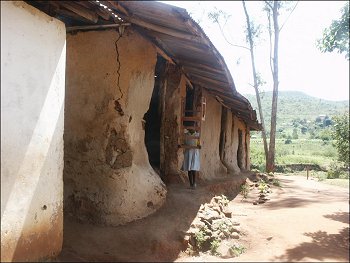 Mud and dung classrooms had to be maintained constantly, especially when they melted in the rain 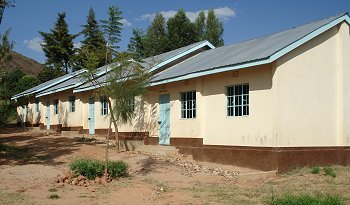 New classrooms will last at least 30 years, freeing teachers and students to concentrate on school work |
"We thought this would be a way to teach Lansing children and the community about how people in other cultures live," Cindy says. "We're not taking any money from the schools. We're not asking children for money, or teachers. People have a choice where they want to put their resources. We're not really asking anything other than organizing an event. They can buy chicken barbecue or don't buy chicken barbecue. Or have their kids go in the bounce house or not. It's an option. We feel we are not taking resources out of the community."
PALS Education Director Maureen Bell maintains contacts with Kenyan graduate students on campus, and people in the local Kenyan community. She offers speakers, help writing a lesson plans, and so on to Lansing teachers. Many of the teachers have taken her up on the offer. Retired Middle School English Teacher Judy Hinderliter used to teach a unit on Kenyan literature. Third graders write letters back and forth from Lansing to Kenya. Middle School Science Teacher Therese Arsenault's students mapped local birds, creating a book with their own drawing s of the birds they saw and facts about them. The Kenyan kids did the same project, and the two classes shared their books so the other could learn about the birds each saw.
"We were really struck by that over there," Cindy says. "The impact of the non-financial things are really huge. We wish the Lansing community could see that. The principal and the teachers would tell us -- the children's lives are hard, there are kids who are ready to give up. But they're very struck by the fact that children half a world away actually are interested in them and their lives. Teachers said they have had children who were ready to give up, but said, 'Well, but those kids wrote to me,' or 'Those kids learned about my school.'
"The little kids will tell you that everybody in America knows about their school!" she continues. "It's a great source of pride to them and it's a great motivator. The warm feelings they feel they get from the Lansing community have a huge impact on them. It's really profound. The buildings are important, but the rest of it is truly important."
Many times things we would not only take for granted, but wouldn't even think about can make the most profound difference. The Mbaka Oromo school's music teacher walked 20 or 30 miles each way to borrow a pitch pipe for a concert twice a year. When the van Es family heard this, their older son said, 'Can't we just get one and mail it over? We don't need a fundraiser.' They picked one up at a local music store and mailed it over.
| Raising Funds by Having Fun | |
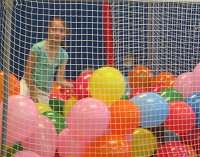 The balloon run at the PALS fundraiser last month | 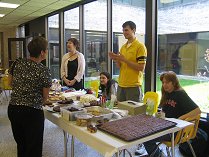 Cookies and cakes at the PALS fundraiser |
The impact of this at the school was huge. "Four years later every time we get a thank you note it says, 'Thanks again for that pitch pipe.'," Cindy says. "When we visited the music teacher went up to our boys and made a big deal about this. Because what they said was, 'Another child gave this to you.' You know, they have this image that Americans are these wealthy old white people who live in castles and will throw some money. But that a child somewhere else thought to give to a child here..."
It went even farther than that, inspiring young African children to act in the same way. "They have since done some projects for younger children in their own community," Cindy says. "They are very struck by this idea of children doing this. They made a huge deal that the money came from just kids, not wealthy adults in America. That younger kids would do this was really profound."
With the school rebuilt out of materials that don't melt in a heavy rain, students have more time for learning. Cindy says that Mbaka Oromo Principal William Kabbis and his staff are looking at how to bring their educational program to the next level. The van Ess hope to bring Kabbis to Lansing in the Fall to meet with our principals, and to see how our schools work.
Both Harold and Cindy are professors at Cornell, and PALS has been a challenge for them as they navigate their jobs and raising three children. "It has taken a lot out of us," Harold says. "Of course it's hugely gratifying, so it's all worth it. But that's the challenge with replicating the model. You need to have several parents who are willing to really put a lot of effort into it."
The couple say that they are almost at a point where their goals for this school have been met, and they will evaluate their future involvement. "We made a five year commitment," Harold says. "We are to some extent by next year we'll be able to say we really kind of accomplished what we hoped to. And it will be a standalone achievement. Then we'll have to decide how we want to continue. Maybe at a different level? Maybe another school?"
Whatever the future holds, Lansing has made a profound difference in one community across the world, and that community has had a real impact here. "We always had this partnership idea in mind," Cindy says. "Because we wanted this school to school partnership piece we decided to stay with one school for at least five years and try to build a relationship. That's different from the model of going to build a lot of schools. That is needed, but it wasn't what our particular idea was."
----
v4i18



